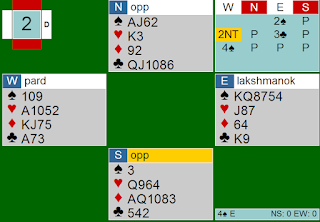W
West
N
North
E
East
S
Me
—
—
—
Pass
Pass
1♠
2♥
3♥
Dbl
3♠
4♥
Dbl
All Pass
And they are playing 4H doubled. I held:
S
Me
♠
Jxxx
♥
J
♦
xxx
♣
AKxxx
I lead the Ace of clubs and dummy comes down holding:
W
West
♠
AQx
♥
Jxxx
♦
Q10x
♣
10xx
Under my Ace of clubs lead, partner plays the Jack of clubs. We play upside-down signals, attitude to first trick. The Jack is, therefore, discouraging but partner might also play the Jack to deny a touching honor. Plan the defense.
First of all, it appears that my 3H limit bid gave West a cheap entry into the auction. Bidding 3S would have put him under pressure. But that is water under the bridge. Can we beat 4H doubled?
At the table, I failed to see past "Jack of clubs is discouraging." In retrospect, I should have applied some bridge logic because partner's signal has completely clarified the position. If partner has Jack-third and is discouraging, then declarer has the queen of clubs and since dummy has the 10, I lose nothing by cashing the second club. Also, with dummy's spade holding, it appears that we are not getting a spade trick. Where are partner's 11 or so opening points? The only way to beat this is for partner to have the AK of diamonds or a doubleton club. If partner has 3 clubs, 5 spades and 2-3 hearts, then declarer must have 3-4 diamonds, so partner's diamond tricks are not going anywhere. I should play the two top clubs, and lead a club for a ruff. If partner has the Ace of diamonds or the KJ of diamonds, he will ultimately come to one more trick.




